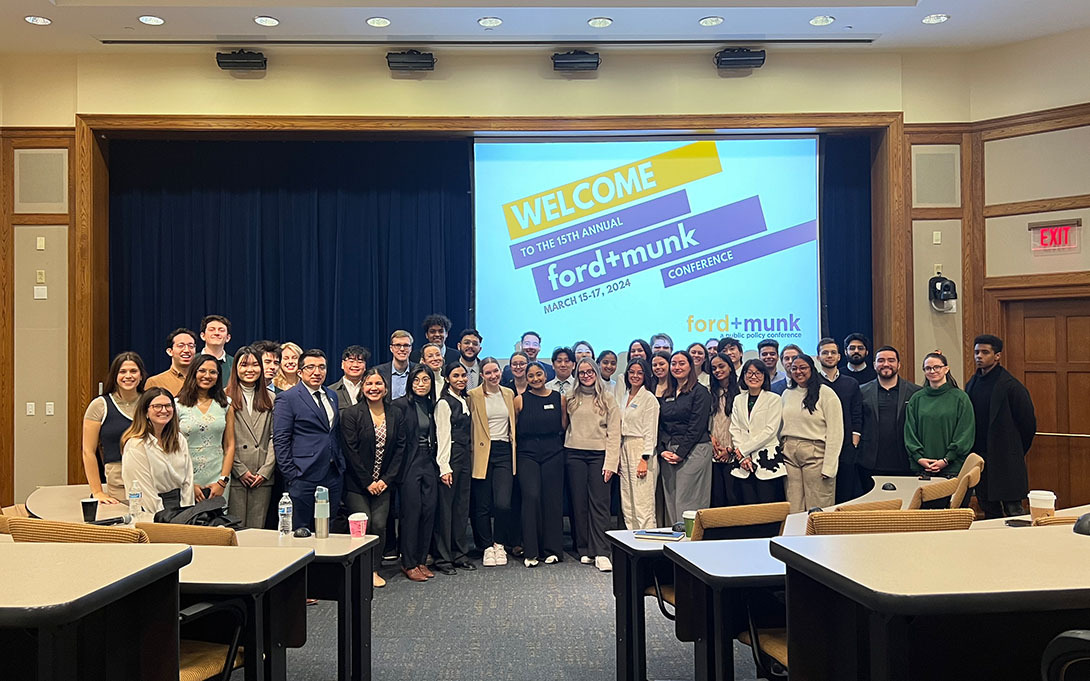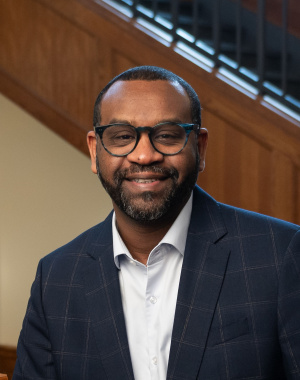
Fifty-one students engaged on pressing AI-related policy questions during this spring’s Ford+Munk case competition. Held annually, the Ford+Munk conference has students from the Ford School and the University of Toronto’s Munk School of Global Affairs and Public Policy analyze, evaluate, and present key findings related to a current policy issue impacting the U.S. and Canada. Student leaders from both schools work together to organize the event, which alternates between Ann Arbor and Toronto, and the International Policy Center serves as an event sponsor. This year’s theme was Ethics, AI, and the Future of Work.
Technology policy expert and assistant professor Yousif Hassan was excited to serve as this year’s faculty advisor, and approached the role as a collaborator to help provide a space for students to grow. He provided context and helped students “cut through all the noise to get to what really matters regarding AI.” He said, “I also learn from the students because they provide different perspectives and ideas. Student leaders shaped the conference based on what other students wanted out of the experience.”
“Ford+Munk is special because it is one of the only opportunities at the Ford School for students to apply MPP coursework in case simulations while also meeting and learning from students from another public policy school,” said Francisco Rentería (MPP‘24), one of the co-chairs of the event.
During the conference’s first day, seven student teams worked on their respective policy projects. Teams considered how ethical AI technologies could enhance manufacturing partnerships between Ontario and Michigan, and how AI could be beneficial for small-medium enterprises, among other topics. Students also heard from U-M engineering and information experts about AI’s future impact on the workforce. After a long day focused on research, the students filled the top floor of Casa Dominick’s during a planned social night where Ford School and Munk School students had the opportunity to socialize with each other.
First year master’s student Abdulla Tarabishy (MPP ‘25) said, “It was great working with the Munk students! I had less familiarity with Canadian policy than they had with American politics. I also felt that the Munk students on my team had a more private sector-oriented approach to issues than I did, and I found their perspective quite interesting.”
Students presented their policy proposals on day three to a panel of judges that included Hassan, the Ford School’s Javed Ali, and the Munk School’s Rhonda McMichael. The panel subsequently selected three winning teams for their bold ideas and solid policy analysis.
Hassan stated that too often people unconsciously limit themselves by what is possible with existing structures and institutions. “If you really want to make a big change, you have to take some risks,” he said.
The competition’s winning teams proposed specific policy solutions relevant for both the U.S. and Canada, as well as how the countries may jointly address the issues. One group recommended the establishment of a collaborative AI ethics board, public feedback system, and uniform border patrol standards. Another group recommended—as a long-term solution—the creation of a bilateral committee to ensure the integration of AI in the trucking industry does not escalate already existing labor shortages. The third group recommended a joint research fund across the two countries that would be focused on creating a government-owned AI patent portfolio, ensuring that AI developments are safeguarded as public assets.
Jacob Gillis (MPP ‘24) and his team focused on how the U.S. and Canada could establish a transnational AI Task Force dedicated to exploring how the countries could address the integration of AI technology in small-medium businesses.
“Ford+Munk was a great opportunity to practice how to make a cohesive and concise case for a policy, which will serve me well in my future. It was also an opportunity to learn more about a technology that will play an increasing role in our lives,” said Gillis.
Student teams presented on the following topics:
- "Mitigating the Impact of AI on workforces through US-Canada Cross Border Partnership"
- "Advancing the Ethical Use of AI in the Automotive Industry: Ontario and Michigan"
- "Overcoming FOMO: Artificial Intelligence Empowerment for Small-Medium Enterprises"
- "Proposal for Michigan-Ontario AI in Manufacturing Task Force"
- "BorderGuard Initiative: Cross-Border AI System Standardization"
- "Steering through Innovation: Protecting Truck Drivers in the age of AI"
- "Great Lakes AI Collaboration Fund"
